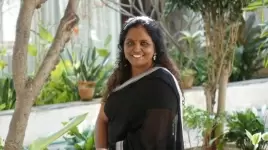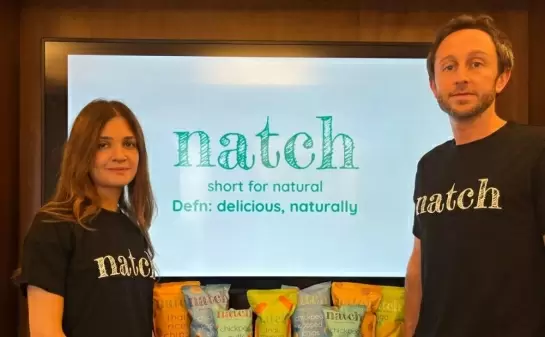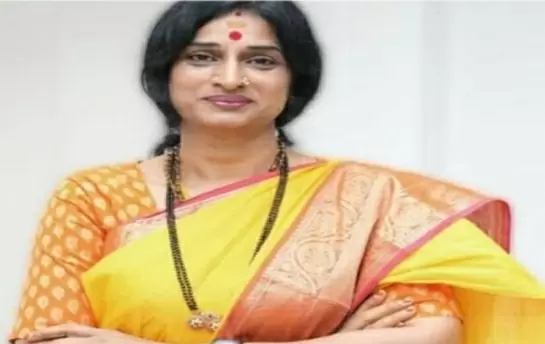In Udaipur, a stitch in time saves lives

07-December-2012
Vol 3 | Issue 49
The garments and artefacts catch the eye as they hang in the Sadhna showroom in the old Udaipur locality of Fatehpura – ‘dupattas’ of every hue, ‘kurtas’ for every size, soft quilts and coverlets made of the finest cotton, handicrafts fashioned out of cloth.
Look at the products more closely and the simple, fine hand work that has gone into them becomes apparent. Tiny running stitches embellish the yoke of a ‘kurti’, colourful appliqué work runs along the length of a ‘dupatta’, painstaking patchwork animates a quilt. Whose hands have plied the needle to create these objects of beauty and comfort? Behind that question lies a tale of hard work, entrepreneurship and institution building.
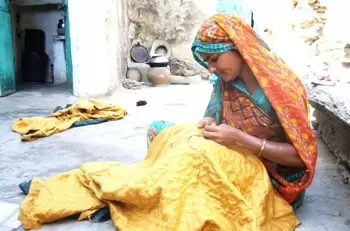 |
|
A total of 700 women artisans are associated with Sadhna, with 250 of its members located in the head office in Udaipur (Photos: WFS)
|
Leela Vijaynergia, chief executive of Sadhna, traces its evolution, “The year 1988 was a period of great distress in Rajasthan because of persistent drought. The men had migrated for work but often couldn’t send enough money home and the women left behind were desperate to make a little extra to keep their families going.
“That was why Seva Mandir, the Udaipur-based voluntary organisation working on social issues, thought of providing an income-generating programme for women. It was called the Patchwork Programme because much of the work centred on patchwork.”
That first group comprised 15 women, some of whom had earlier worked as manual scavengers. Today, that group has evolved into a mutual benefit trust called Sadhna and currently represents 700 women artisans in 16 urban, peri-urban and rural locations in the Rajasthan districts of Udaipur and Rajsamand.
Each artisan is an owner member of the organisation, participating in its decision-making process through a representative. Their husbands are farm workers or migrants who drive rickshaws or do plumbing, painting and masonry work in the cities and often the women themselves are farm workers.
Sadhna’s products reflect the age-old traditions of local women. They may not have much formal education but the one skill they possessed is sewing.
Priya Khan, Social Manager, Sadhna, explains, “Traditionally, quilting and the running stitch was very much a part of the domestic scene in these parts. ‘Razais’ (Quilts), bedcovers, ‘dupattas’ and other household knick-knacks were made from old cloth placed one layer over the other and stitched together.
“We built on that base. Every Sadhna member first undergoes a three-month training programme. Improvised methods were used to train them, for instance the distance between one row and the other is often measured by using the span of four fingers. Over the training period they learn to use finer, neater stitches for a better finish.”
But tradition had to combine with modernity because Sadhna’s products cater to the urban market. “What we chose to develop was also based on the consideration that since Udaipur is a centre for tourism there is scope to add value to local products and sell them. Today, all our work revolves around three crafts – the running stitch, appliqué work and patchwork, using natural fibres as well as natural dyes. But we also take orders, and sometimes these are for synthetics,” Vijaynergia points out.
As the institution changed, so did the women. Manjula Singh, Design Executive, Sadhna, recalls how, in the early days, the women artisans hid themselves behind their saris and would not step out of their homes.
“But as they earned their own money and interacted with others, as their status within the family grew because of the income they brought in, they themselves got transformed. Earnings are linked to output, which in turn is related to the time the women can spare for sewing – some make Rs 5,000 a month (US$1=Rs 55), others barely Rs 200.”
“We have tried to make this organisation as representative as possible,” states Vijaynergia. In order to do this, Sadhna’s 700 women artisans are divided into 49 groups, each of which has a leader, who functions as the interface between the artisans and the organisation. These leaders – rotated every three years – are part of the organisation’s management committee and participate in the decision-making process. They also ensure that the material to be sewn reaches the women in the community.
Stitch by stitch, as the organisation grew, it ensured that norms were followed – including the strict ban on child labour. Most of the artisans are between the ages of 25 to 40, although the older ones could be anywhere between 55 and 60. In 2011-2012, Sadhna had a sales figure of Rs 3.35 crore, with 60 per cent of all profits going to the artisans directly.
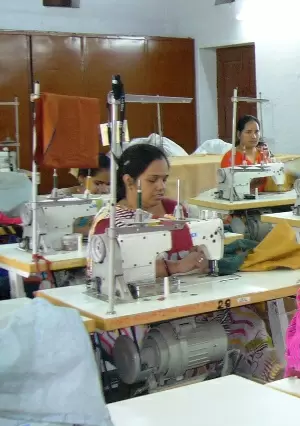 |
|
Some women earn up to Rs 5,000 a month
|
While Sadhna’s head office is in Udaipur – 250 of its members are located there – it has an equally large presence in the attractive heritage town of Dilwara, in Rajsamand district, which is about 25 kilometres from Udaipur city. Sadhna has now set up a common facility centre here where trainings and meetings are regularly held.
Visit Dilwara around mid-day and chances are that you will find many women sitting in the courtyards of their homes, plying their needle. Just like Sita Devi, 38, mother of two girls and a boy, who lives a few streets away from Dilwara’s famous 450-year-old Jain temple complex. She, along with her sister-in-law, Sangeeta, sit together, tracing chalk lines made on pieces of ochre cloth with a fine running stitch, even as Sangeeta’s eight-month-old toddler mewls and cooes in one corner of the courtyard.
“I sit down to my work after the morning chores are done – usually around 10 am. Our leader is Laxmi and she brings us work. I work for six to seven hours a day – not at a stretch but off and on, as time permits,” reveals Sita.
Earlier she was very dependent on the money that her husband, an autorickshaw driver in Ahmedabad, Gujarat, used to send. Not anymore. Last month, for instance, she received a sum of Rs 5,970 in her bank account, thanks to the Sadhna work.
The money is useful to cope with everyday expenses like the children’s schooling. “There are always needs to be met,” says Sita. “Recently, I got my elder daughter married. Now I want to build two extra rooms in my home and this money will help.” - Women's Feature Service






